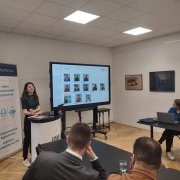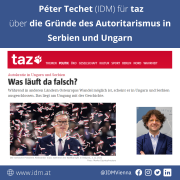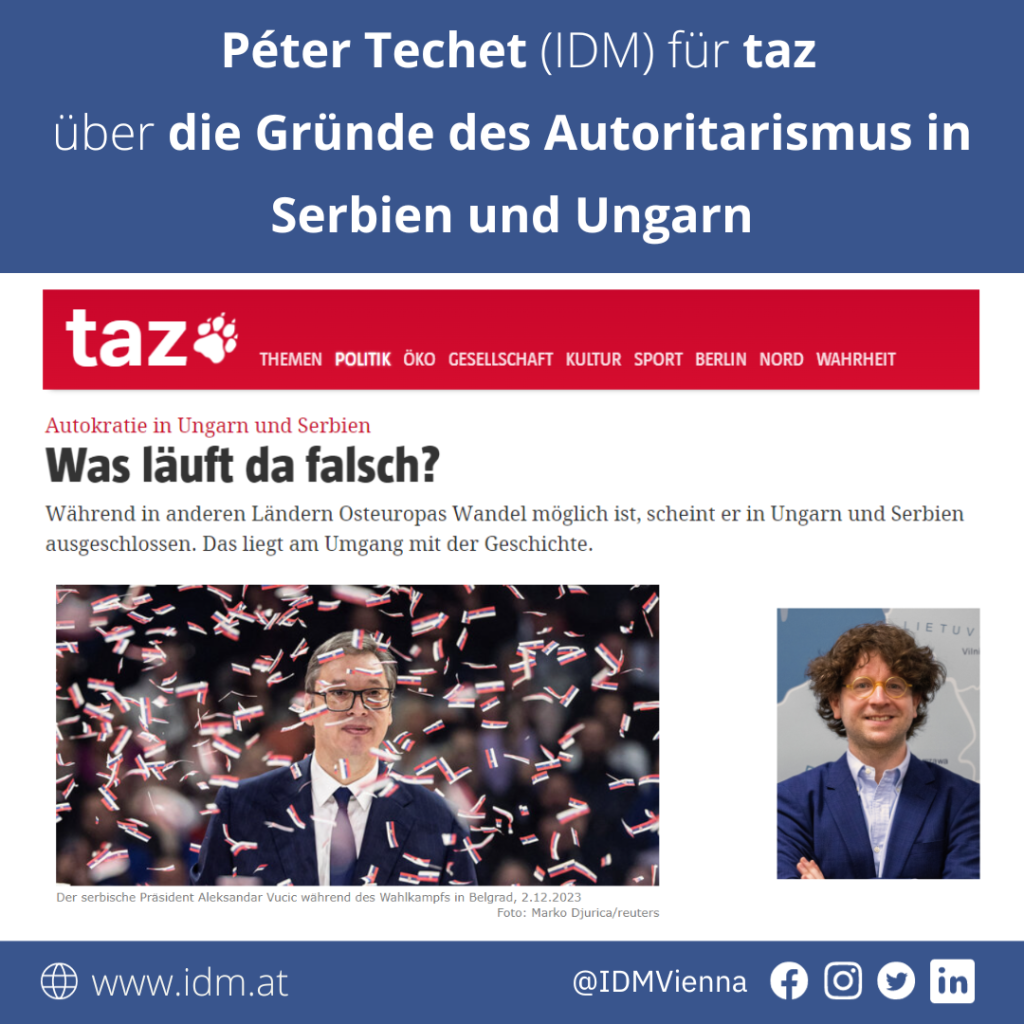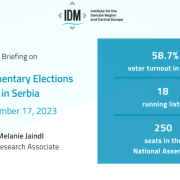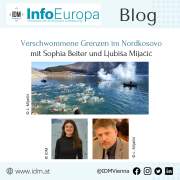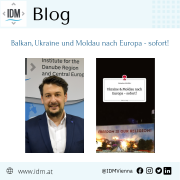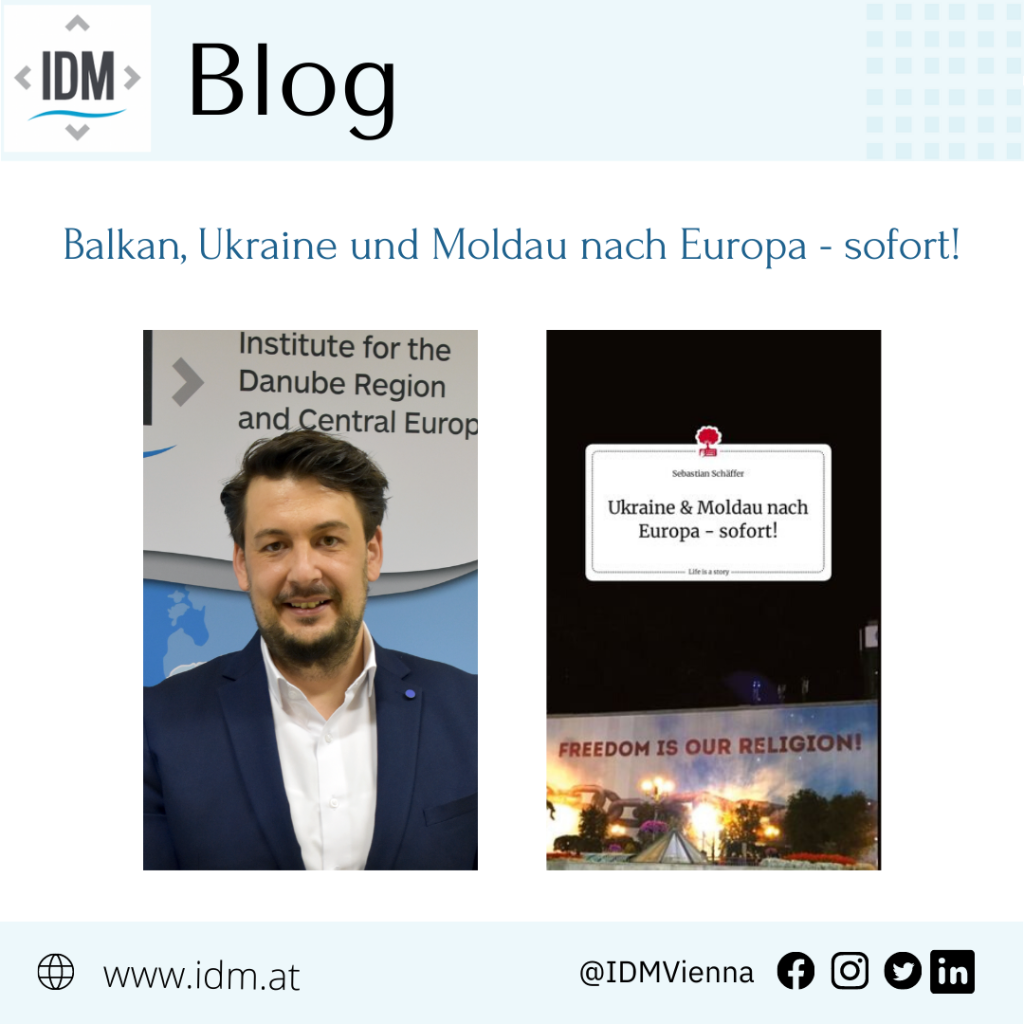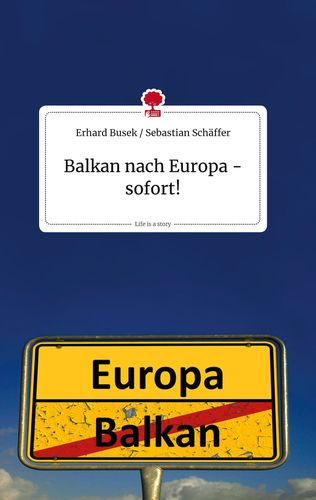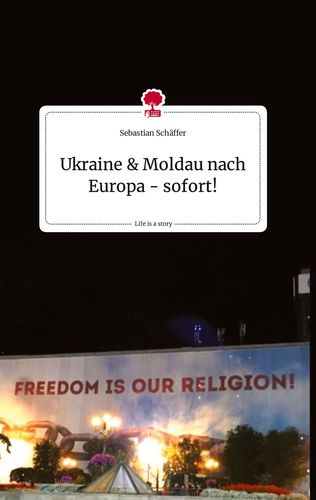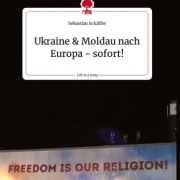
In Absprache mit China montierte das serbische Innenministerium tausende Kameras zur biometrischen Gesichtserkennung. Trotz der versuchten Geheimhaltung, fand die Zivilgesellschaft ihre Standorte und technischen Spezifika heraus, wie DANILO KRIVOKAPIĆ in seinem Gastbeitrag erklärt.
Nach drei Jahren harter Verhandlungen verabschiedete die Europäische Union 2024 ihr Gesetz zur Regulierung künstlicher Intelligenz (KI) und bestätigte dabei die Vorreiterrolle der EU in diesem Bereich. Vor dem globalen Hintergrund stellt das Gesetz einen mutigen Schritt dar, denn wie aus unserer kürzlich durchgeführten Untersuchung „Beyond the Face: Biometrics and Society“ hervorgeht, gibt es nur wenige bis gar keine umfassenden rechtlichen Bemühungen, den Einsatz von KI in ihrer schädlichsten Form – der menschlichen Gesichts- und Verhaltenserkennung – einzudämmen. Ob in den Vereinigten Staaten, Australien, China, Brasilien, Südafrika oder den Vereinigten Arabischen Emiraten: Die jeweiligen Vorschriften decken die Risiken der bereits eingesetzten Technologien nicht einmal ansatzweise ab.
Menschenrechtsorganisationen in Serbien äußern ebenfalls Bedenken über die Transparenz, menschliche Aufsicht und den Datenschutz in Bezug auf die vorgeschlagenen oder verabschiedeten KI-bezogenen Gesetze. Als EU-Beitrittskandidat übernimmt Serbien nach und nach EU-Rechtsstandards, doch bei deren effektiven Umsetzung und insbesondere im Bereich der Menschenrechte, Rechtsstaatlichkeit, Unabhängigkeit der Justiz und der Korruption bestehen weiterhin Probleme. Die jüngsten globalen Entwicklungen haben die Situation im Land noch komplexer gemacht. Die politischen, wirtschaftlichen und technologischen Einflüsse aus Russland und China setzen Serbien weiteren geopolitischen Spannungen aus.
Unter dem Vorwand der Sicherheit
Anfang 2019 kündigten die serbischen Behörden Pläne zur Einführung eines Systems zur Gesichts- und Nummernschilderkennung an, das die gesamte Hauptstadt Belgrad erfassen sollte. Solche Maßnahmen würden die Sicherheit der Bürger*innen gewährleisten und die Regierung betonte, dass die ständige automatische Überwachung „nicht missbraucht werden kann“. Details bezüglich technischer Einzelheiten, finanzieller Auswirkungen, angestrebter Ziele oder Vorkehrungen zum Schutz vor möglichen Menschenrechtsverletzungen gab sie jedoch nicht bekannt. Vertreter*innen der Zivilgesellschaft, die über Anträge auf Informationsfreiheit versuchten an Informationen zu gelangen, wurden abgewiesen.
Der SHARE Foundation ist es dennoch gelungen, die Hintergründe zumindest teilweise aufzuklären. Im Rahmen eines stillen Abkommens über die wirtschaftliche und technische Zusammenarbeit zwischen Serbien und China entstand die Initiative „Sichere Gesellschaft“, die Informations- und Kommunikationstechnologien stärken und die Sicherheit von Bürger*innen verbessern sollte. Huawei, der damalige Hauptpartner der Initiative, veröffentlichte unbeabsichtigt Details: Eine Fallstudie auf der Website des Unternehmens beschrieb die technischen Besonderheiten der Systeme und verwies auch auf den Kontakt mit dem serbischen Innenministerium. Nachdem die Medien darüber berichteten, entfernte Huawei die Fallstudie umgehend.
Die Hauptkritik an diesen Maßnahmen ist das völlige Fehlen einer vorhergehenden öffentlichen Debatte über die Notwendigkeit eines solchen Systems und über die spezifischen Probleme der öffentlichen Sicherheit, zu deren Lösung es beitragen sollte. Die ständige und wahllose Überwachung öffentlicher Räume verstößt an sich gegen die Verfassungsbestimmungen zum Schutz der Menschenrechte und es gab keine Begründung, warum eine Ausnahmeregelung erforderlich ist. Nichtsdestotrotz begannen die Behörden mit der Installation der intelligenten Kameras in Belgrad, insbesondere zu Beginn der COVID-19-Pandemie im Jahr 2020, als die öffentliche Bewegungsfreiheit stark eingeschränkt wurde.
Netz aus Kameras
Aufgrund der fehlenden offiziellen Angaben nahm die Öffentlichkeit die Ermittlung der Standorte der intelligenten Kameras selbst in die Hand. Die Bürgerinitiative #ThousandsOfCameras (#hiljadekamera) erstellte eine Karte, auf der die verifizierten Standorte, die Anzahl und die technischen Daten dieser Kameras verzeichnet waren. Diese Karte unterschied sich sehr deutlich von der Liste der Kamerastandorte, die die Polizei später veröffentlichte. Auf ihr wurden dreimal weniger Kameras in Belgrad angeführt. Nachdem sich der öffentliche Druck auf sie erhöhte, aktualisierte die serbische Polizei ihre Liste, veröffentlichte sie aber nie in Form einer Karte, sondern lediglich die Namen von Straßen und Kreuzungen.
Um das Bewusstsein für die Kameras in der Öffentlichkeit zu schärfen und dem vorherrschenden Narrativ entgegenzuwirken, brachten Aktivist*innen auffällige Aufkleber mit QR-Codes an Kameramasten an. Auch von der Überwachung inspirierte Kunstinstallationen tauchten überall in der Stadt auf. Eine erfolgreiche Crowdfunding-Kampagne machte sogar eine eigene Modekollektion, #hiljadekamera, beliebt, während Websites, kurze Videodokumentationen und Podcasts sich dem Thema widmeten.
Ende des Sommers 2021 verlagerten sich der Diskurs und die Sorgen rund um die biometrische Überwachung in Serbien auf die legislative Ebene. Das Innenministerium leitete eine als öffentlich bezeichnete, aber unauffällige Debatte über ein vorgeschlagenes neues Polizeigesetz ein, das gesetzliche Bestimmungen für den Einsatz biometrischer Massenüberwachung vorsah. Lokale Menschenrechtsorganisationen erhielten erhebliche Unterstützung von globalen und regionalen Organisationen gegen dieses Vorhaben und innerhalb von zwei Tagen zog das Ministerium den umstrittene Vorschlag zurück. Damit tauchte Serbien auf der Landkarte des weltweiten Kampfes gegen biometrische Überwachung auf.
Ein unheimlicher Trend
Biometrische Technologie verwendet menschliche Merkmale zur Identifizierung von Personen. Werden diese Systeme im öffentlichen Raum eingesetzt, kann dies als biometrische Massenüberwachung betrachtet werden. Sie beruht auf der willkürlichen Erfassung, Verarbeitung oder Speicherung sensibler biometrischer Daten in großem Maßstab ohne Kontrolle oder Wissen der jeweiligen Personen. Expert*innen und Aktivist*innen warnen immer wieder, dass dies die Grundrechte und -freiheiten unangemessen einschränkt. Das Gefühl, ständig überwacht zu werden, habe eine Abschreckwirkung und könne dazu führen, dass Menschen weniger am öffentlichen Leben teilnehmen.
Im Buch „Beyond the Face: Biometrics and Society“, das im Dezember 2023 auf der Tactical Tech in Berlin und im Europäischen Parlament)vorgestellt wurde, untersuchen die Autor*innen die Verwendung biometrischer Massenüberwachung, die rechtlichen Rahmenbedingungen und die Risiken, die sie für Menschen und insbesondere gefährdete Gruppen auf der ganzen Welt, darstellen. Betrachten wir die rasanten Entwicklungen in diesem Bereich, ist die Studie keineswegs vollständig. Sie bietet aber eine umfassende Momentaufnahme des weltweiten Status quo der biometrischen Überwachung im Jahr 2023. Zudem gibt sie einen Überblick über dokumentierte Fälle aus den Bereichen Polizeiarbeit, Grenzkontrolle und Crowd Management aus Myanmar, Großbritannien, Frankreich, den USA – und Serbien.
Zurzeit ruht der zivile Kampf um öffentliche Räume frei von willkürlicher Überwachung in Serbien. Mehrere Verantwortliche wurden entlassen und Gesetzesentwürfe zur Überarbeitung zurückgezogen. Das KI-Gesetz der EU bringt etwas Erleichterung, da es neue Maßstäbe für risikobasierte Schutzmaßnahmen setzt und dringend benötigte neue Perspektiven aufzeigt. Gleichzeitig bleibt abzuwarten, inwieweit dieses KI-Gesetz die serbischen Gesetzgeber*innen beeinflussen wird. Denn es scheint sicher, dass die Regierung ihr Bestreben nach teurer und komplexer biometrischen Massenüberwachung nicht völlig aufgegeben hat. Sie sieht sich in den globalen Trends zur Versicherheitlichung der Gesellschaft bestätigt, die die Unterschiede zwischen Demokratien und autokratischen Regimen verwischen. Und obwohl keine Rechtsvorschriften erlassen wurden, werden immer noch in ganz Serbien biometrische Überwachungssysteme installiert.
Und so hängen weiterhin Tausende von intelligenten Kameras über unseren Köpfen, auf unseren Straßen und Plätzen, und erinnern uns auf unheimliche Weise daran, dass unsere Körper nur einen Klick davon entfernt sind, zu digitalisierten Objekten in einem dystopischen Experiment zu werden.
Danilo Krivokapić ist Direktor der SHARE Foundation, einer in Belgrad ansässigen Organisation für digitale Rechte. Er ist Mitbegründer der Initiative #hiljadekamera, die sich für den verantwortungsvollen Einsatz von Überwachungstechnologie einsetzt.










